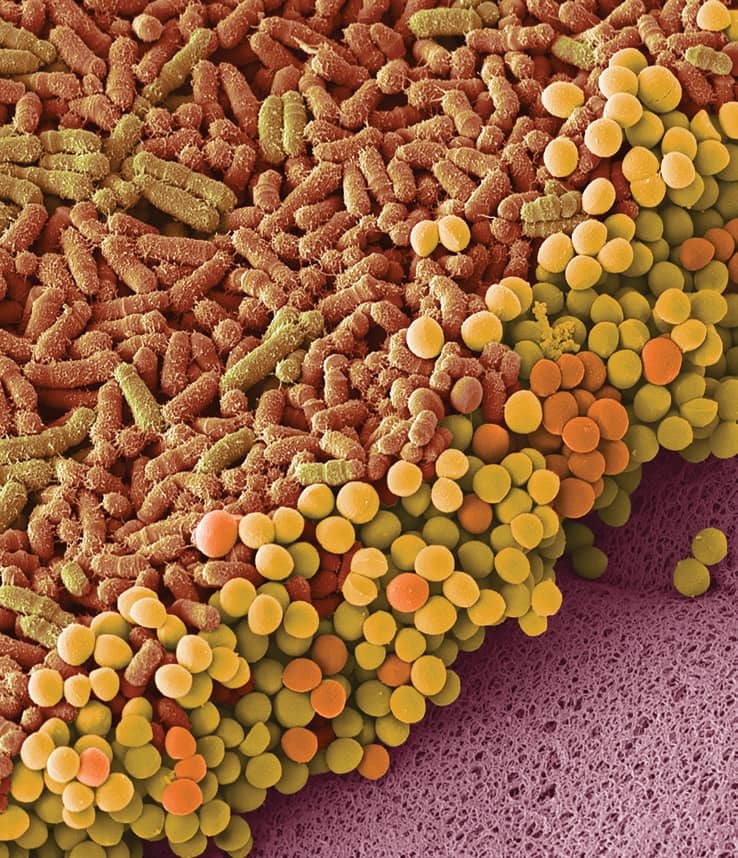يحاول ذهب - حر
A New Wave Of Bacteria Is Coming Soon…
September/October 2020
|Very Interesting
We get inside the labs that are growing beneficial bacteria to gobble up pollution, harvest waste, generate energy and help keep us healthy

WHAT ARE BACTERIA?
Bacteria are microscopic, single-celled life forms. Bacterial cells tend to be smaller than human cells, and they have a simpler internal structure. But, despite this simplicity, bacteria are astonishingly successful. They can live all over the planet in many different environments, including hot springs, hyper-salty lakes, the highest mountains and the deepest oceans.
We’re in trouble. Our over-reliance on fossil fuels and our taste for foods with a high carbon footprint is causing disruptive climate change. Our throwaway society has flooded the land and seas with plastic pollution. And we face a growing public health crisis triggered by the rise of disease-causing microbes that we cannot kill with antibiotics.
Now for the good news. The last few years have brought promising evidence that we might be able to pull carbon dioxide (CO2) out of the atmosphere and slow the pace of climate change, that we have the potential to grow high-quality protein without the large carbon footprint, and that we can clean up our pollution and blunt the impact of antibiotic resistance. The common element in all these potential breakthroughs? Bacteria.
As unlikely as it might sound, our future health and happiness might be secured by these humble microbes.

HUMAN HEALTH
Beneficial bugs that heal the body
هذه القصة من طبعة September/October 2020 من Very Interesting.
اشترك في Magzter GOLD للوصول إلى آلاف القصص المتميزة المنسقة، وأكثر من 9000 مجلة وصحيفة.
هل أنت مشترك بالفعل؟ تسجيل الدخول
المزيد من القصص من Very Interesting

Very Interesting
TAKE IT SLOW
Slow running is a fitness trend with some hard and fast science behind it
3 mins
July/August 2024

Very Interesting
Physics, AI and music share a common thread. You just have to know where to look
Studying science can lead you in many directions and open doors to unexpected possibilities along the way
3 mins
July/August 2024

Very Interesting
BED BUGS VS THE WORLD
When bloodthirsty bed bugs made headlines for infesting Paris Fashion Week in 2023, it shone a spotlight on a problem that's been making experts itch for decades: the arms race going on between bed bugs and humans
10 mins
July/August 2024

Very Interesting
Kids are the key to understanding obesity. But we need more of their genes...
We can unravel the role that bodyweight plays in disease, but we need a bigger, more diverse, sample of genetic material to do so
3 mins
July/August 2024

Very Interesting
COVID inquiry: What did we learn and what can we do better in future pandemics?
Masks, social distancing, lockdowns... how effective was the UK's response to the COVID-19 pandemic?
3 mins
July/August 2024

Very Interesting
One hormone could be the key that unlocks a cure for morning sickness
The nausea and vomiting that, in extreme cases, can endanger mothers and babies might soon be just a memory
3 mins
July/August 2024

Very Interesting
THE WORLD'S WEIRDEST CREATURES
Under the sea and upon the land, some animals look - to us - pretty strange...
8 mins
July/August 2024

Very Interesting
WHEN MIND AND MACHINE COLLIDE
First, Elon Musk wanted to make electric cars ubiquitous, then he wanted to make space exploration a private enterprise. Now, with Neuralink, his newest venture, Musk hopes to merge humans and artificial intelligence. Turns out, it might not be such a crazy idea...
10 mins
July/August 2024

Very Interesting
COME OUT OF YOUR SHELL
Social anxiety is more than just being shy. It's a phobia born out of our evolutionary past. But that raises a puzzling question: why do so many of us fear human interaction when we're supposed to be the most sociable species on the planet?
8 mins
July/August 2024

Very Interesting
SPACE ODDITIES
Take a tour of the weirdest spots in the universe, where the 'normal' rules don't apply. Places that squeeze time, blow bubbles and even rain glass... sideways
6 mins
July/August 2024
Translate
Change font size
